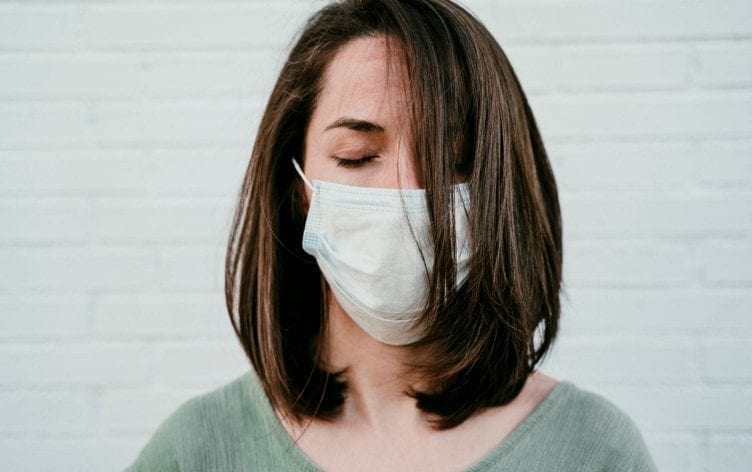
5 Common Types of Anxiety and How to Cope
With the world as we know it changing radically due to a global pandemic, survey research indicates anxiety is on the rise. “It makes a ton of sense,” says Rachel Gersten, a licensed therapist and health coach. “We’re used to some level of certainty, even if we understand that we can’t predict what will happen on a day-to-day basis. That’s really been taken away during the pandemic, and it’s incredibly difficult to adjust.”
Uncertainty is a breeding ground for anxiety, explains Julia Kogan, PsyD, a health psychologist who specializes in stress and insomnia, because it makes us imagine hypothetical future situations that tend to be worst-case scenarios. Unfortunately, imagining these hypotheticals doesn’t protect us. It just leaves us feeling anxious, which can affect our overall health, as well as our efforts to get or stay fit.
Even those who’ve figured out how to cope with all this uncertainty may be dealing with anxiety, says Heather Lyons, PhD, licensed psychologist and co-founder of WithTherapy. “Now, later in the pandemic, the anxiety has changed to feelings of overwhelm as the lines between work and home are blurred, and many parents anticipate a return to homeschooling in September while also juggling work.”
Whatever the reason, many people who never experienced anxiety before — or who only dealt with it rarely — are now facing it frequently. So what should you look out for, and how can you cope? Here are five new-to-many types of anxiety that are on the rise, plus what to do about them.
HEALTH ANXIETY
While it’s understandable to be vigilant about your well-being right now, interpreting every little physical symptom as a sign you have COVID-19 (or any other health issue) could be a red flag you’re dealing with some level of health anxiety.
“Many of my clients are reporting hyper awareness of any unusual body reactions such as coughing, sneezing, changes in breathing or other symptoms they worry may be suggestive of COVID-19,” Kogan says.
Another clue health anxiety may be an issue, Kogan says: Persistent worry about being sick or getting sick even if you’re feeling totally fine. “Those with health anxiety tend to continue to worry about their health despite lack of symptoms, reassurance from doctors and medical testing.”
How to cope: Deep relaxation and consider therapy.
“Make sure to engage the deep relaxation response daily,” Kogan advises. “When anxiety is triggered, the fight-or-flight response is triggered along with it, resulting in physical, behavioral and emotional symptoms of anxiety.” Deep breathing and relaxation exercises can help activate your body’s natural calming response. “Even just a few minutes daily can make a big difference,” Kogan says.
Therapy may also be a good option if you’re really struggling with health anxiety (or any other type of anxiety). “It’s quite normal to experience anxiety every once in a while, but it’s time to get therapy when anxiety begins to interfere with your relationships, self-care or work,” Lyons says.
ISOLATION ANXIETY
“One type of anxiety that I’ve seen increase is related to social disconnection,” Lyons notes. Research indicates social connection is actually a very important part of overall wellness, and likely has health-protective effects.
“As humans, we’re hard-wired for connection,” Lyons adds. “Currently, we’re isolated. And when we do have connection, it’s often mediated by technology.” Socializing this way just isn’t quite the same, since it lacks physical touch and makes it difficult to read nonverbal cues. Believe it or not, this can make us feel exhausted rather than energized by our efforts to connect with others.
“I’m hearing much more that people are feeling lonely and start to fear that this sense of loneliness is never-ending,” Lyons notes.
How to cope: Stay in the present.
Worrying about feeling alone forever is understandably anxiety-inducing. So try to stay in the present, Kogan suggests. “Notice when you are thinking about the future and watch out for thoughts that start with ‘what if.’ Then, gently bring yourself back to the present and remind yourself to focus on what you know in the present and what you have the ability to control.”
REENTRY ANXIETY
Getting back to work, school and regular life activities is one of the most common sources of anxiety at the moment, according to Kogan. While guidelines about what’s safe and not safe to do were relatively clear during the initial quarantine phase, they are murkier as things begin reopening.
“Without clear guidelines, people must create their own boundaries and proceed with what they are comfortable doing,” she adds. Unfortunately, that’s not always easy.
A major sign of reentry anxiety is avoidance, Lyons says. “We might find ourselves not only avoiding getting back into the swing of things, but even avoiding conversations or thoughts about reentry.” On the other hand, you might be worrying so much about the consequences of getting back to normal that it disrupts your productivity or social time.
How to cope: Adjust to the new normal with structure.
“Creating structure and routine that includes a work- and home-life separation, mood-boosting activities for enjoyment and stress relief, and attention to health behaviors such as physical activity, eating nutritious meals and limiting alcohol use is helpful for reducing stress,” Kogan says. “Structure calms the mind and regularly planning enjoyable activities is helpful for stimulation and stress relief.”
SLEEP ANXIETY
“When stress is high, it can be difficult to fall asleep, stay asleep and sleep until our usual times,” Kogan says. So ironically, at a time when many people need more sleep, many are also having a harder time getting enough rest overall.
There are several reasons why. First, when we’re anxious, muscle tension increases, Kogan says. “High levels of anxiety are very emotionally and physically draining, but despite feeling exhausted, too much muscle tension can still make it difficult to fall asleep, which is incredibly frustrating.”
Second, for many people, anxiety is higher when they’re trying to go to bed. This can translate into racing thoughts that make sleep feel impossible, according to Kogan.
Lastly, being stuck at home may be at play. “If people are regularly out of the house and doing a variety of activities normally, they are expending energy throughout the day that can promote quality sleep at night,” Kogan explains. This is one of the reasons exercise is so good for anxiety. “However, most people are doing less than usual, especially outside of the house.” That adds up to not feeling sleepy at night. “This can result in people trying to force sleep, which can increase anxiety,” Kogan says.
How to cope: Try this grounding exercise.
“There’s a trick I recommend that helps calm your brain down,” Gersten says. “Take a few deep breaths, then name three things you can see, hear and feel. This exercise helps ground you to reality and focus your brain away from the spiral of thoughts in your head.”
NEWS ANXIETY
“With the onslaught of coronavirus-related news, people are now unintentionally spending hours reading negative story after negative story (also known as doom scrolling), which can raise anxiety and stress levels,” Gersten says. Sure, you want to stay informed, but after awhile, more information isn’t necessarily better.
“It’s important to recognize that sometimes doom scrolling can become compulsive because it’s initially serving to relieve anxiety, but then ends up fueling it,” Lyons explains.
Here’s how it works: You pick up your phone to see “what’s new,” maybe unconsciously hoping for a new breakthrough in treatments or vaccines. Or, you might be seeking reassurance that things are OK, and nothing even worse than what’s currently happening is going on in the world. “For a moment, knowing that you have this ability to pick up your phone and find ‘the answer’ can bring down levels of anxiety,” Lyons says. “However, what ends up happening over time is that people are exposed to headlines meant to draw attention by heightening emotion. This leaves us more anxious.”
How to cope: Reflect and set firm boundaries.
“Pause and ask yourself, ‘Am I learning anything new or am I reading the same information stated multiple different ways?’” Gersten recommends. “Oftentimes, it’s the second one, and taking a moment to reflect on what’s going on can help you stop and sign off rather than continuing to doom scroll.”
Gersten also recommends setting specific times each day to log off. “Whether that’s a half hour before bed (which is also great for sleep habits) or when you’re at dinner (which helps you be more mindful with your food and with others if you have a roommate, partner, etc.), find something that’s realistic for you, so you can focus more on what’s going on in front of you rather than what’s on your screen.”
Unlock an experience that’s like having a dietitian, trainer and coach at your fingertips. Sign up for Premium for expert guidance and tools to help you reach your personal health goals.





